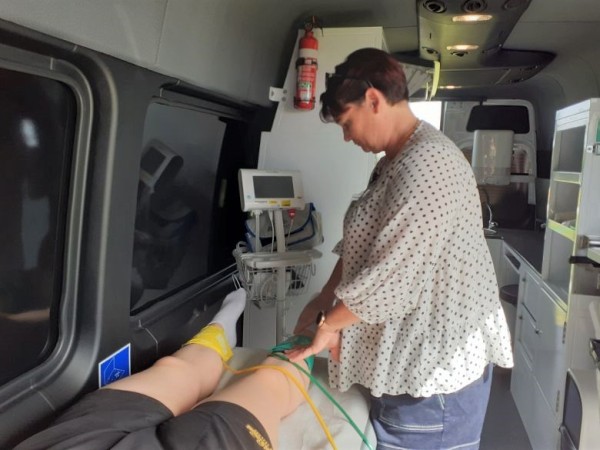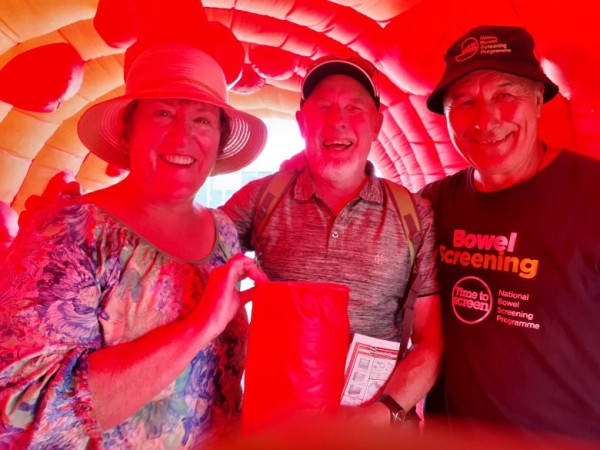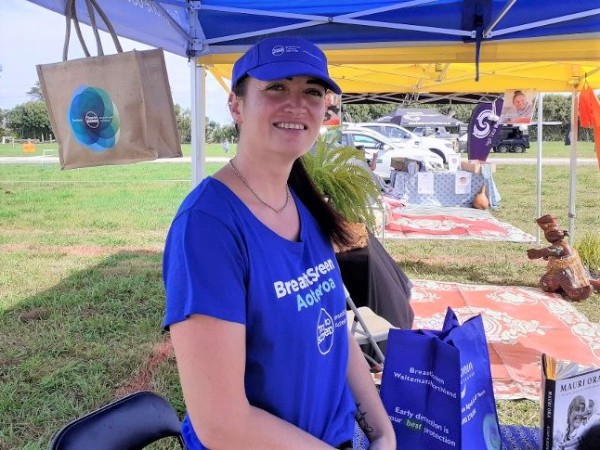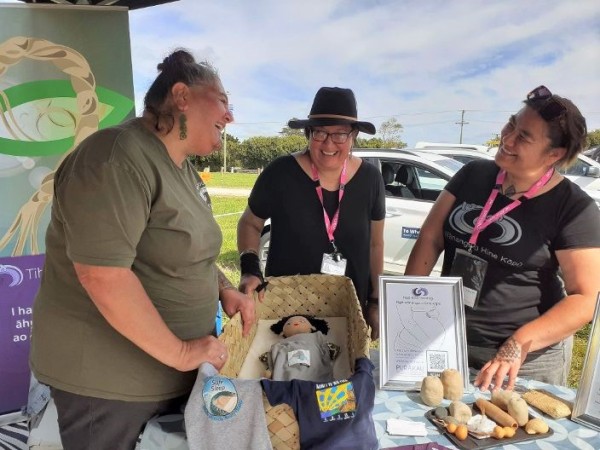Encouraging health and wellbeing at the Northland Field Days
The People's Bus Te Pahi O Ngā Iwi rolls into the Field Days
A new mobile health diagnostic service that took to Northland roads late last year had a major public showing at the Northland Field Days.
Te Whatu Ora Te Tai Tokerau’s van, Te Pahi O Ngā Iwi (The People’s Bus), travels the region’s mid and far north to provide a range of diagnostic, assessment and treatment services for people, without them needing to visit a hospital.
This includes echocardiograms to examine the structure and functioning of the heart. Echo ultrasound waves are turned into moving pictures of the heart that can be viewed on-screen. It plays an essential role in cardiovascular care, including early detection and treatment of heart disease.
Te Whatu Ora plans for the service to soon also provide other diagnostic services such as vascular (blood vessels) and ophthalmology (eyes) scans.
The van is a fully equipped diagnostic clinic, with a dual-purpose ultrasound scanner, computer, satellite dish, a bed, as well as air conditioning to keep patients and staff comfortable.
The mobile service will also incorporate telehealth technology, with the future goal to link with GP practices and rural hospitals.
Planned Care Initiative and Performance Manager Michaela Matich said the mobile service will help achieve a more positive health outcome for people, following timely diagnosis.
Michaela said it has the potential to address some of the health equity issues that have affected Te Tai Tokerau communities.
“It will benefit our most vulnerable, our most deprived, to increase equity of care, improve the patient and whānau experience and their health outcomes.”
When the service was launched Kaikohe-based Te Hau Ora o Ngāpuhi Clinical Support Specialist Hemaima Reihana-Tait said the diagnostic van will help to overcome the hurdle of accessing healthcare and expertise.
“Te Pahi o Ngā Iwi is an example of closing the health equity gap by bringing the mountain to Muhammed, to Hine, to Hone and all of us in the communities.''

Nurse Specialist (Vascular) Robyn Martinovich in the mobile diagnostic van, Te Pahi O Ngā Iwi (The People’s Bus), at the Northland Field Days.
--
Walking through the endoscopy process
It is not every day people can walk through a huge bowel complete with polyps (growths) and early-stage cancer tumours, nor does the idea sound like much fun.
However, the rather benign seeming inflatable bowel-come-tunnel that was part of Te Whatu Ora's Wellness display at the recent Northland Field Days at Dargaville raised plenty of smiles as well as quite a few oohs and aahs.
''We're literally walking through the endoscopy process,'' said Stuart Selkirk, Te Tai Tokerau-based Health Promotion Leader.
Beside him as he spoke of the need for bowel testing, Field Days visitors Annette Davies and John Waldren from Whangarei prodded bouncy rubber polyps and learned about how easily they can be removed from the human bowel. Most polyps can be effectively removed, reducing the risk that bowel cancer may develop.
Bowel screening is the key to getting to any growths early, Stuart said.
''People are still a bit hesitant about being tested. Bowel cancers appear more prevalent in Europeans simply because they do more testing. Māori are opening up to the conversation but we need to reach more.''
There may be no warning signs that someone has bowel cancer. The National Bowel Screening Programme, currently free for people aged 60 to 74 years but soon to reduce the age of eligibility, aims to find bowel cancer at an early stage when it can often be successfully treated.
The test can be done at home and is simple to do, and anyone in the eligible age group can take part.
The testing kit arrives in the mail and requires the person to take a small stool (poo) sample, about the size of a matchstick head, then post the provided safely contained and sealed envelope back to the national screening organisation.

Field Days visitors Annette Davies and John Waldren with Bowel Screening Health Promotion Lead Stuart Selkirk inside the giant inflatable bowel on display at the Northland Field Days.
--
Advocating for regular mammograms at the Field Days
Nikki Rogers is a Kamahi (support worker) based at the Mauri Ora Breast Clinic in Whangarei.
Nikki said that while there is a greater uptake of the service these days, there's still a certain shyness - "whakaama" - attached to the process for many Māori women.
''Our mobile service captures our rural wahine and women. It is viewed as less stressful and takes away some of the added pressure of travelling to a main centre.''
Based at the Mauri Ora Breast Clinic in Whangārei, Nikki was at the Te Ara Hauora Wellness Hub at the recent Northland Field Days.
''I think having a presence here is important. We welcome this opportunity to let more women know about the eligibility for the free screening service.''
As well as offering pamphlets and the chance to chat about why early, regular mammograms are so vital, Nikki had an assortment of goodies to give away.
''The free lip balm helps,'' she said of encouraging passers-by to join in that vital conversation.
Women aged between 45 and 69-years old are eligible for a free breast screen every two years, whether they visit a city-based clinic or wait for the fulltime mobile service to come to a community near them.
Mammograms can often detect cancer earlier than changes in the breast can be felt.
Even women who have regular mammograms should watch out for changes in their breasts and if they find something, see their doctor rather than wait for their next due breast screen.

Mauri Ora Breast Clinic Kamahi (support worker) Nikki Rogers
--
Wahakura traditional woven flax baskets helping reduce Sudden Infant Death in Infants
Quite often the best-outcome health stories are not about, for example, multi-million-dollar hospital upgrades, giant steps for humankind through space-age technology, miracle drugs or faster moving surgical queues.
Sometimes the best results are brought about when health and support workers look backwards to find a simple, common-sense solution capable of turning around a devastating, deadly trend. Then, fervently promoting that solution amongst those who most need it - and vitally, providing the means of change.
That is what has happened in Te Tai Tokerau to overturn the grim number of whānau losing their babies to SUDI (Sudden Unexplained Death in Infants). In Aotearoa New Zealand this year alone, between 40 to 60 baby deaths are expected to be called SUDI.
But while the word 'unexplained' occurs in the description, in many cases there has been an identified link between SUDI and three lifestyle factors: smoking during pregnancy, the position of the baby while sleeping and sharing the bed with a baby in an unsafe way.
Enter the wahakura, a traditional woven flax or less traditionally a light wooden basket, for a baby to sleep in while sharing the parent's bed. The wahakura is made of a breathable and sustainable natural material, has a flat base, firm mattress and sides strong enough to prevent or alert someone inadvertently rolling onto the baby.
Since the strong uptake of wahakura in the region, alongside strong maternity and post-natal messaging, Te Taitokerau now has the lowest number of SUDI where it once sat high in the national statistics.
Nga Wānanga o Hine Kōpū is the driving force behind new parents being given a wahakura, the gift coming with a support system that includes traditional and modern approaches to pēpi (baby) and whānau care.
''Māori deaths no longer top the stats, and that's for the first time in the 30 years since statistics have been recorded. That's wonderful,'' said Mereana Pou, kaitiaki (team leader) with mid-North ante-natal, birth and post-natal provider Nga Wānanga o Hine Kōpū.
''The evidence we have now about co-sleeping and smoking and SUDI can't be ignored. We've known about it for a long time but it's no good just telling people not to do it, you have to provide them with more than that to keep the baby safe, too,'' Mereana said.
''These (wahakura) are tāonga and, in that way, they and the good baby care they're part of become part of the whakapapa of that whānau. Whakapapa comes with both accountability and responsibility.''
Te Tai Tokerau is not the only region in New Zealand benefiting from the use of wahakura but offers a fine case for embracing traditional, Māori-focused care models to improve maternity and infant health outcomes.
Te Tai Tokerau has for some years had the highest Māori birth rates in New Zealand. In 2014-2015, 50 percent of births were to Māori mothers, only 20 percent of whom attended mainstream antenatal classes. There was a clear need for culturally relevant antenatal education. Māori health change agents were able to slot some missing pieces into the puzzle - using knowledge they had already in hand.
Layered throughout Ngā Wānanga o Hine Kōpū's kaupapa and practices is the intention expressed in the whakataukī: "Let us heal our wairua through affirmative action.''
It does that through providing a free kaupapa Māori labour, birth and parenting programme designed for wahine hapū (pregnant women) and their whānau. The service offers two-day wānanga for wāhine and their whānau who are expecting a baby, with much of the programme embedded in matauranga (traditional knowledge and concepts).

Spreading the good news about safe co-sleeping for infants, from left, Mereana Pou, kaitiaki (team leader), and kaihapai (support workers) Paula Wetere and Tyler Nolan, from Nga Wānanga o Hine Kōpū.
Last modified:
